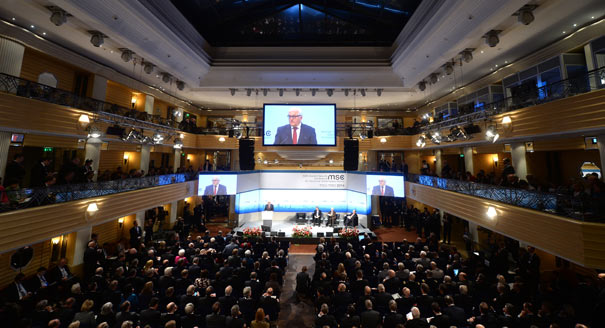Europe has a war on its doorstep. The war is just a three-hour plane trip from where hundreds of leaders, security experts, and defense chiefs will gather on February 6 for the annual Munich Security Conference (MSC).
Since the violence in eastern Ukraine escalated in January, thousands of civilians have been caught up in the fighting between Russian-backed separatists and Ukrainian soldiers. The civilians have little food, electricity, water, or shelter. When they try to flee to neighboring villages or towns, security is not a given.
Getting humanitarian aid through is extremely difficult. The EU’s soft power tools of civilian assistance, diplomacy, and sanctions have so far been no match for the kind of Russian hard power that is now engulfing parts of eastern Ukraine. That mismatch highlights the West’s general lack of strategic direction, which has huge implications for global security.
Then, the West procrastinated as Yugoslavia descended into a bloody civil war. Such procrastination encouraged Serbian president Slobodan Milošević and his forces to exploit such weakness by wreaking havoc in Croatia, Bosnia and Herzegovina, and Kosovo. NATO’s bombing campaign against Serbian positions finally ended the war in 1999. It was that, not sanctions, that defeated Serbia.
When it comes to Ukraine, the West has learned little from the lessons of the Yugoslav Wars. For many different reasons, the Europeans and the Americans are reluctant to use force to stop Russia from dismembering Ukraine.
Even at the most fundamental level, such as providing basic security and protection to civilians, inaction by many European governments and the United States has been shameful. So much for the Responsibility to Protect, the mantra heard so often before NATO’s disastrous military campaign in Libya in 2012. R2P has disappeared from the lexicon of diplomacy, of values, and of realpolitik.
The same could be said for the millions who have fled the war in Syria or who are fleeing Islamic State militants in Iraq. The neighboring countries, particularly Turkey, Lebanon, and Jordan, have had to bear the brunt of huge influxes of refugees. Meanwhile, populist and anti-immigrant movements living in the comfort zone of Europe protest against opening the doors to those who need protection.
The lack of security for civilians in eastern Ukraine or the Middle East betrays Europe’s questionable commitment to its values and its unwillingness to defend those values. They are about basic human rights, including the right to security.
The West's reluctance to defend its values has moral and political implications.Tweet This
The Europeans’ and Americans’ reluctance to protect these values carries moral and political implications for the West. If European and other Western leaders cannot provide even a modicum of security in conflict zones, their hope of building any new security architecture with Russia is misplaced, to say the least.
It is misplaced because any such architecture that Western leaders want to build with Russia—and which will be debated in Munich—should start from the premise of values, not realpolitik.
Realpolitik has not yielded positive results. Russia’s role in the Syrian conflict and President Vladimir Putin’s consistent support for Syrian President Bashar al-Assad is a case in point. Realpolitik aside, Putin has also questioned the West’s values—as if human and civil rights were not universal.
Yet the West is now in a very weak position to defend its values, whether participants at the MSC will admit that or not.
The war in Ukraine and the rise of the Islamic State have not only exposed those weaknesses. These threats have also exposed the limits of realpolitik and interests, as Angela Merkel, the German chancellor, knows full well. For many months now, she has been at the forefront in trying to persuade Putin to stop supporting the Russian separatists. Her admirable tenacity and attention to detail have not been enough to end a conflict that is radicalizing both sides.
Even if diplomacy has so far failed, Merkel, undeterred, will travel to Kiev and Moscow on February 5–6 to present new peace propopsals. But she will not pursue the option of hard power in Ukraine. That is not just because the German public would oppose it, but also because Merkel does not believe in the military option.
Back in the 1990s, Milošević and his Serb forces gained ground and time because the Europeans were unwilling to use force until so late in the war. Now, Putin and his separatists can work on the same assumption. They can establish facts on the ground and assume that the West will not intervene in or arm Ukraine.
Even if diplomacy has failed, #Merkel will not use hard power in #Ukraine.Tweet This
The German public, however, has had no qualms about arming Kurdish forces fighting against Islamic State in northern Iraq or about training Kurdish Peshmerga fighters. “We have the chance to help save lives and prevent any further mass murder,” Merkel said in a statement to the German Bundestag in September 2014. “We must use this chance.”
The Islamic State’s brutality has shocked publics in Europe, the United States, and the Middle East, which explains why Merkel was able to win public support for arming and training the Peshmerga. In that case, Berlin managed to combine values (defend the defenseless) with interests (supply weapons but don’t join the fighting).
But closer to home, there is a war in Europe’s East that is becoming increasingly brutal. It is going to demand a very different security environment between Russia and the West to end that war and to restore Ukraine’s stability and territorial integrity. Anything less would do untold damage to the West.








